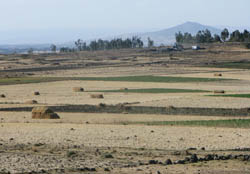Through the supplementary grant from the Bill & Melinda Gates Foundation, we started exploring opportunities for expanding N2Africa to Ethiopia. From 9 to 13 January, Ken and I paid a first visit to this country, where we met some of the key partners that could later help us developing a proposal for N2Africa in Ethiopia. In Addis Ababa we had a meeting with people from ILRI, IWMI and CIMMYT. They gave us some more insight in the cropping systems and purposes of the different legumes in Ethiopia, and informed us on other initiatives around legumes that N2Africa could link to. We also had a broader look at input and output markets for legumes and spoke to representatives of IFDC, the Ethiopian Agricultural Transformation Agency and the WUR-coordinated Soyabean Value Chain project. A trip through the beautiful Rift Valley took us to Hawassa, for meetings at Hawassa University. We also spent one afternoon in the field to get a better idea of the complexity of farming systems around Hawassa, where crops like enset (false banana), coffee, maize and vegetables are grown altogether on small pieces of land.
| Chickpea and soyabean came out as promising priority legumes to work on. Market outlooks for both crops are favourable; soyabean could be important for import substitution, whereas chickpea offers potential as export crop. In some areas, chickpea is grown at the end of the rainy season on residual soil moisture. This not only gives a stunning pattern of green dots in the dry season (see photo), but also allows farmers to practice double cropping for additional income. A disadvantage of chickpea is, however, that the large seeded varieties grown for export are popular for green pod consumption, so that extra labour is required to guard the fields. Next to chickpea and soyabean we will probably also work with common beans, grown for export in the area around Hawassa, and with forage legumes. |
 |
The next step towards the development of a proposal for N2Africa in Ethiopia will be a workshop in the beginning of May, which we organise in cooperation with Tilahun Amede of ILRI. This workshop should give us a clearer picture on which legume niches to focus on in this vast country, and what the focus of our activities should be to increase legume production in Ethiopia. Soon after the workshop we plan to start with some pilot activities around variety screening and seed bulking, so that we are well prepared for the real work!
Esther Ronner
